(English below)
Los documentales de música viven una época de esplendor y se han convertido en un fenómeno popular que cada vez tiene más adeptos en todo el mundo. Pero este éxito no es casual ni tampoco fruto de una moda pasajera, sino que se debe a la existencia de un público exigente que desea conocer otras realidades y experimentar maneras distintas de vivir la música en pantalla grande. A pesar de marcar tendencia y resucitar carreras de artistas olvidados, este género cinematográfico sigue siendo una rara avis dentro del panorama audiovisual porque apenas tiene presencia en los canales de televisión generalista, pero siempre ha gozado de una gran popularidad gracias la rumorología, a los bootlegs piratas que circulaban en VHS y a las actuales descargas de Internet. Aún así, los dos últimos años ha sucedido lo impensable y un par de documentales de música han ganado el Oscar de Hollywood… evidentemente nos referimos a “Searching for Sugar Man” y “20 Feet From Stardom”. Cada uno con su buena dosis de leyenda. Siguiendo esta tradición de contar la historia trágica de artistas muy relevantes, el pasado año se presentó el documental “Heaven Adores You”, un viaje íntimo por la música y los demonios personales de Elliott Smith (1969 – 2003), un artista que empezó en una banda de rock alternativo en Portland y se convirtió en una estrella en solitario gracias a la nominación al Oscar por su aportación a la banda sonora de la película “El Indomable Will Hunting” de Gus Van Sant. Hemos tenido la oportunidad de entrevistar al director y productor Nickolas Rossi para conocer los entresijos de este película que ha triunfado en festivales internacionales y ya se considera una obra de culto dentro del firmamento de los documentales de música.
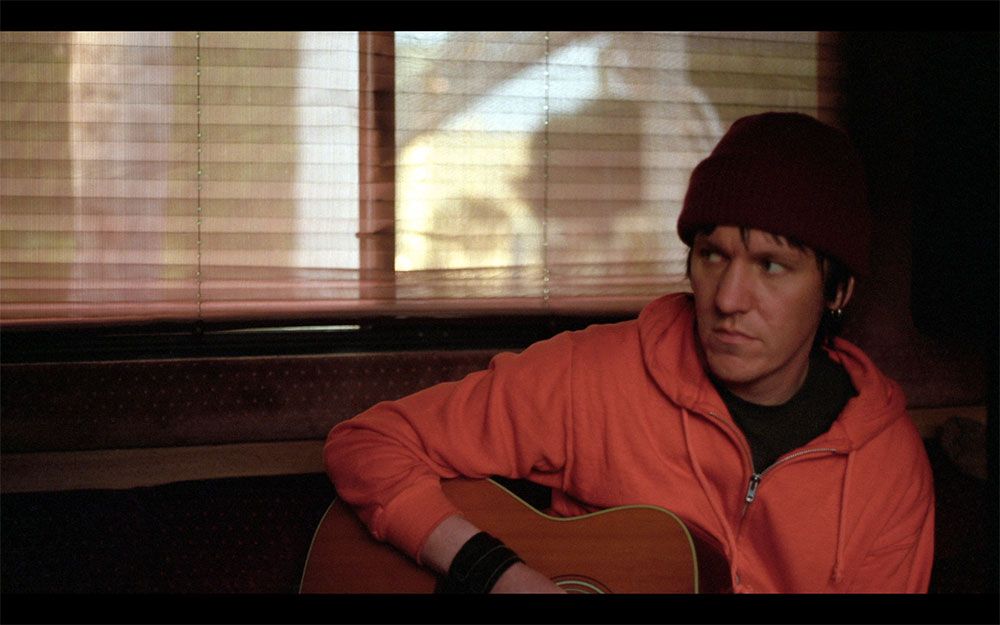
Elliot Smith on tour, circa 1998
Te propongo que nos remontemos a los inicios de tu carrera. ¿Cómo recuerdas la experiencia de trabajar como director de fotografía en documentales? ¿En qué momento empezaste a plantearte la posibilidad de debutar con un proyecto propio?
He trabajado como director de fotografía durante los últimos 12 años y es una experiencia que disfruto muchísimo. La transición hacia la dirección de un documental estuvo más condicionada por el tema que por el deseo personal de dirigir. Estoy muy cómodo contando una historia de manera visual, así que este proyecto se presentaba como la opción perfecta. Siempre me ha gustado la música de Elliott y creo que su poesía es algo muy visual para empezar a narrar. Ha sido un viaje increíble hacer esta película.
Tengo entendido que te licenciaste en sociología por la Portland State University. ¿Tuviste la oportunidad de ver en directo a Elliott Smith en aquella época? ¿Cómo era la ciudad a mediados de los años 90?
Viví tanto en la misma ciudad de Portland como en los alrededores del Pacific Northwest entre 1994 y 1999. Entonces vi muchas veces en directo a Elliott Smith, ya fuera actuando con su banda (Headmiser) o en solitario. La escena musical de Portland en aquellos días era la unión increíble de mucha gente con talento que creó una comunidad muy vibrante, aunque la ciudad sigue teniendo artistas muy buenos en la actualidad.
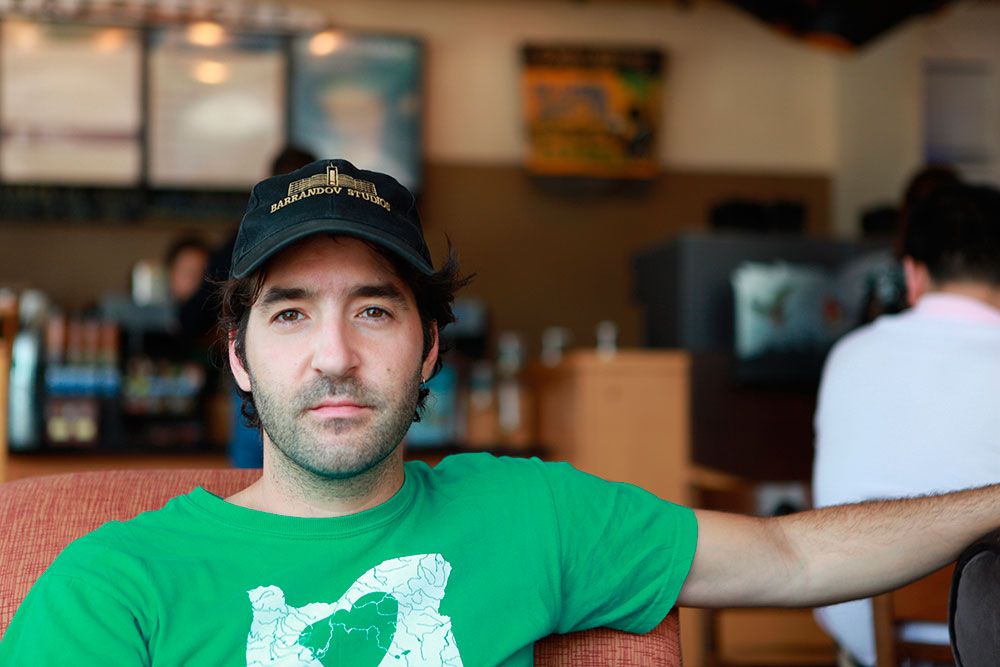
director & producer Nickolas Rossi
Supongo que la gran pregunta es ¿por qué decidiste hacer un documental sobre este artista de culto? Curiosamente, has estado implicado en muchos documentales sociales, pero ninguno de música…
Este proyecto empezó con el vídeo de recuerdo que grabé en Los Ángeles el día después de la muerte de Elliott. Fotografié el Solutions Wall de Silverlake como una manera de rendir tributo a la experiencia que yo había tenido al escuchar la música de Elliott cuando era más joven y vivía en Portland. Ese vídeo inició una conversación muy intensa sobre el impacto real que las canciones de Elliott han tenido en una generación. Tomando como referencia esta conversación y colaborando con gente con mucho talento, como Jermiah Gurzi, Kevin Moyer y Marc Smolowitz, fuimos capaces de observar con atención lo que este artista había logrado durante su vida.
Uno de los aspectos que más me ha gustado de “Heaven Adores You” es que todas las intervenciones de Elliott Smith provienen de entrevistas radiofónicas. Creo que este detalle logra que el documental tenga un sentimiento especial y nos recuerde la época analógica…
Los fragmentos de entrevistas radiofónicas fueron el punto de partida del proyecto del documental para mi personalmente puesto que marcaron el camino que iba a tomar la historia. En estas grabaciones escuchamos a Elliott describir sus experiencias de primera mano al mudarse a Portland, al marcharse de la ciudad para vivir en Nueva York, al romper con su banda, etc. La radio nos inspiró a tener a Elliott hablando lo máximo posible sobre su propia vida durante el metraje.

Elliot Smith on tour, circa 1998
También destaca el ritmo lento y pausado, que permite al espectador reflexionar sobre lo que está viendo. ¿Por qué decidiste mostrar tantos rincones de ciudades? ¿Tuvieron estos lugares influencia en la vida de Elliott Smith?
Aunque en el documental se ven muchos sitios donde Elliott vivió o frecuentó en la vida real, la verdad es que no quería ser demasiado específico o riguroso al rodar en los lugares reales. El objetivo de mostrar tan detalladamente las ciudades era para presentarlas como elementos de fondo que ayudan a ilustrar el viaje que emprendió Elliott y dejar espacio para escuchar lo que él cuenta o disfrutar de sus canciones. Las tres ciudades que aparecen tienen estéticas muy distintas y creí que sería interesante mostrarlas casi vacías para ayudar a que el espectador sintiera que Elliott ya no está aquí… a pesar de que todavía tenemos su voz.
Mucha gente afirma que los documentales se convierten en una realidad en la sala de montaje. ¿Podrías contarnos cómo fue el proceso de edición de “Heaven Adores You”? ¿Intentasteis contactar con Gus Van Sant para entrevistarlo o saber su opinión?
No teníamos un guión del documental, sin embargo, empecé a trabajar a partir de un esquema de la vida de Elliott mucho antes de encerrarme a editar. Sabía donde empezaba la narración, donde terminaba y todo lo que había en medio. Realmente fue un trabajo de conectar los puntos y experimentar nosotros mismos el propio viaje de Elliott. Una vez tuvimos una primera versión del montaje, tuve la enorme suerte de trabajar en Oakland (California) con un editor increíble que se llama Eli Olson, que me ayudó mucho a terminar la historia de una manera hermosa y convincente. Sí que contactamos con Gus Van Sant al principio del proyecto, pero creo que nuestras agendas no pudieron coincidir para colaborar. Aunque sí que vio el documental y fue muy amable con sus comentarios.
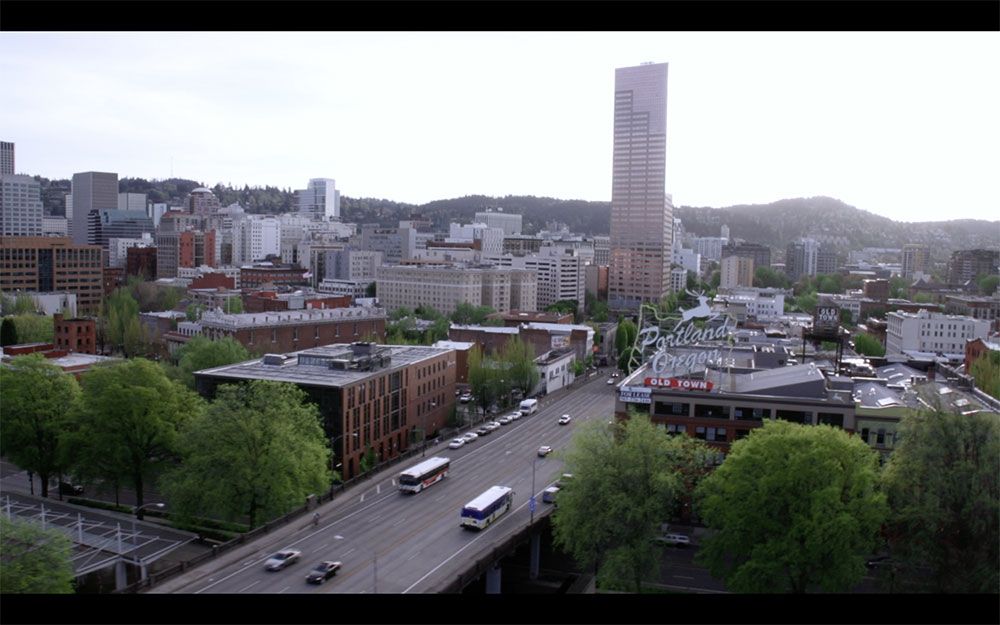
in 1984, Elliot Smith left Texas to live with his father in Portland, OR
¿Fue complicado reunir esa cantidad tan grande de material de archivo de Elliott Smith para ilustrar su vida en la gran pantalla? Realmente lo vemos crecer delante nuestro, tanto personal como musicalmente…
La mayoría de fotos y de material de vídeo proviene de los amigos de Elliott, así que es muy especial que hayan compartido sus recuerdos con nosotros. Hemos tenido el enorme privilegio de poder utilizar muchas de las imágenes personales que sus amigos íntimos tenían de todos los años que compartieron junto a Elliott.
Reflexionando sobre el objetivo de este documental, ¿qué te interesaba más, mostrar el reverso de un icono musical o hablar del lado oscuro de la fama cuando sólo quieres huir de ella?
El objetivo del documental era poner la música de Elliott en el centro de la historia y en el lugar que realmente se merece. Fue un artista increíble que dejó tras de si una música fantástica que esperamos que siga escuchándose y compartiéndose durante muchas generaciones. Y, a pesar de que hubo un lado oscuro en la fama de Elliott, había muchas más cosas en él y en su carrera que creíamos que eran relevantes como parte de la historia que queríamos contar.

Elliot Smith on tour, circa 1998
¿Cómo fue el estreno de “Heaven Adores You” y en qué festivales internacionales se ha proyectado?
Hemos tenido un recorrido muy exitoso por festivales tanto en 2014 como en lo que llevamos de 2015, con más de 40 proyecciones en 5 continentes. La música de Elliott es apreciada en todo el mundo y nos alegra saber que el interés de la gente y el apoyo de sus seguidores sigue intacto después de una década de su muerte. He tenido la suerte de hablar con fans en Europa, Canadá y Australia y es impresionante que la gente disfrute sentándose en un cine a escuchar la música de Elliott durante 104 minutos.
Ahora que el documental es un éxito, ¿estás pensando ya en tu próximo proyecto? ¿Qué tipo de documentales te gustaría rodar en el futuro?
Supongo que aún se tiene que ver hacia dónde me lleva todo esto. Ha sido un enorme placer pasar tantos años trabajando con el equipo de este documental y estoy muy emocionado por lo que puede venir a continuación.
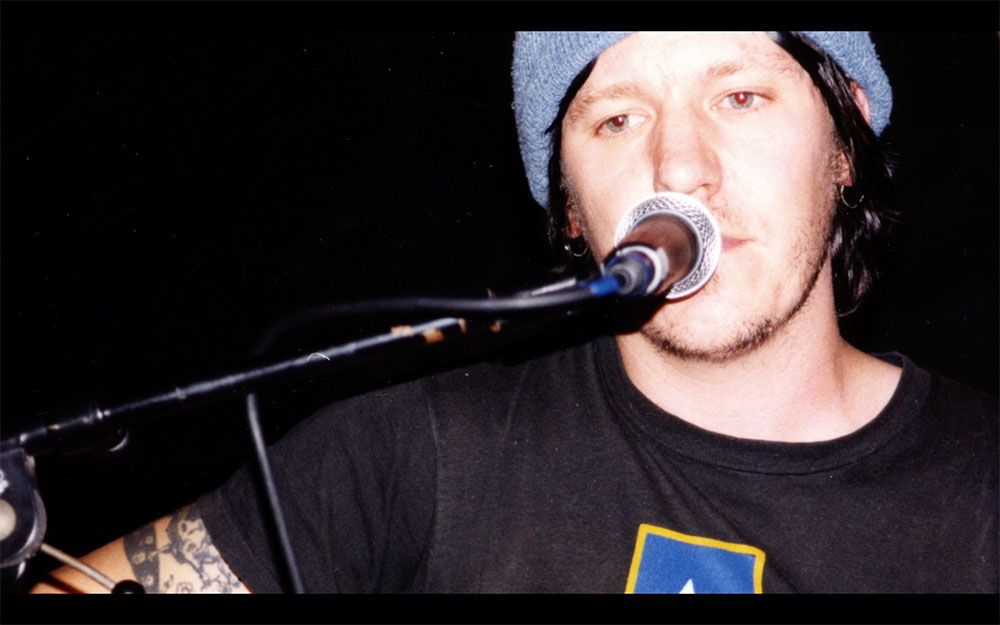
Elliot Smith
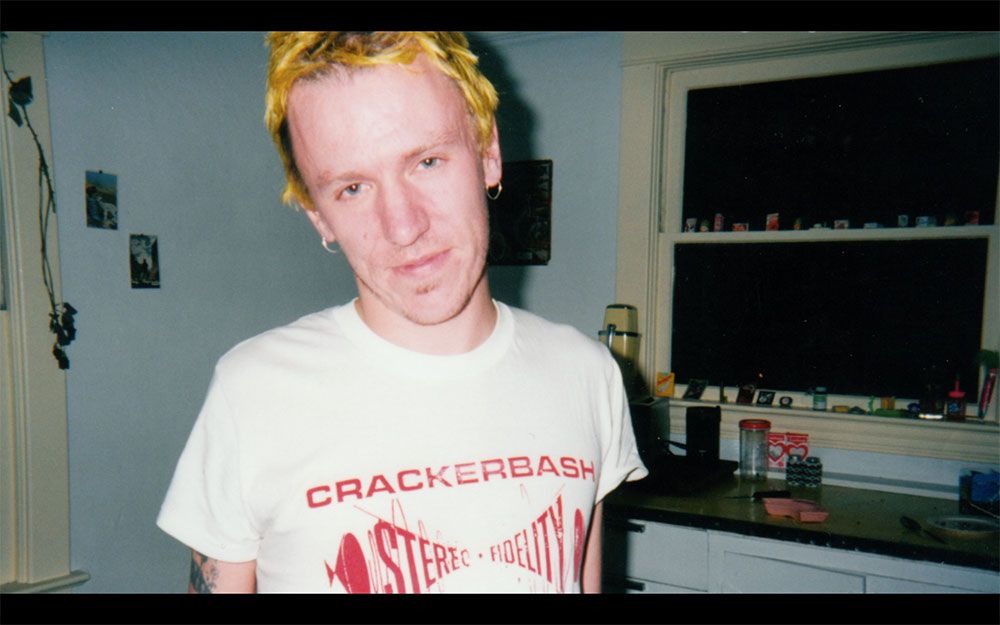
Elliot Smith in Portland. F: Joanna Bolme


McGolrick Park, located in Greenpoint, Brooklyn, NY. Elliot Smith lived in Brooklyn in late 90s
TRAILER:
________________________________________________________________________________________________________________
“HEAVEN ADORES YOU”.
THE DOCUMENTARY ABOUT ELLIOTT SMITH
Music documentaries are living a heyday and have become a popular phenomenon that has progressively gained supporters all around the world. But this isn’t either a coincidental success or a fad. It is due to the existence of a demanding audience that wants to discover other realities and experiment different ways of living music on a large screen. Even though they are setting a new trend, this cinematographic genre is still a rara avis inside the audiovisual scene since they barely have a presence on general TV channels. However, they have always had a great popularity thanks to the word-to-mouth, the pirated bootlegs that circulated on VHS and the current Internet downloads. Even so, during the past two years the unthinkable has happened and two music documentaries have won an Oscar: “Searching for Sugar Man” and “20 Feet From Stardom”. Each of them with a legend dose. Following this tradition of telling the tragic story of relevant artists, the documentary “Heaven Adores You” was released last year. A personal journey through the music and the personal demons of Elliott Smith (1969 – 2003), an artist that started his career in an alternative rock band in Portland and became a star thanks to an Oscar nomination for his contribution to the soundtrack of “Good Will Hunting”, by Gus Van Sant. We had the opportunity to interview the director and the producer Nickolas Rossi and to find out the hidden details of a movie that has triumphed in international festivals and is already considered a masterpiece inside the music documentary sphere.
Let’s start this story from the beginning: how was your experience working as a cinematographer in feature films and documentaries? When did you start thinking about directing your own project?
I’ve been working as a cinematographer for the past 12 years, and I really enjoy that work immensely. Transitioning to directing a documentary was more about the subject matter than the desire to direct. I’m very comfortable telling a story visually, so this project seemed to be a perfect fit. I’ve always enjoyed Elliott’s music and think his poetry is very visual to begin with. It was a great experience to be able to make a film about Elliott Smith.
I have read that you graduated from Portland State University with a degree in Sociology. Did you have the chance to see live or meet personally Elliot Smith in those days? How was the city in the mid 90’s?
I lived in and around the Portland and the Pacific Northwest between 1994 and 1999. I saw Elliott perform a number of times, both in Heatmiser and as a solo artist. The music scene in Portland back then was an incredible pool of really talented people who created a very vibrant community. Portland still continues to produce some really incredible artists.
I guess the big question is: when and why did you decide to make a documentary about this artist? You had been involved in many social documentaries, but never a music project…
This project started with a memorial video that I shot in Los Angeles the day after Elliott died. I photographed the Solutions Wall in Silverlake as a way to memorialize the experience that I had with being impacted by Elliott’s music when I was younger and was living in Portland. That video started a bigger conversation about the real impact that Elliott’s music had on an entire generation. By following this conversation, and collaborating with some really incredibly talented people, like Jermiah Gurzi, Kevin Moyer, and Marc Smolowitz we were able to really look at what this artist had accomplished during his life.
One of the things that I really enjoyed about your film is that nearly all Elliott’s interview excerpts were taken from radio interviews. This decision gives the documentary a special feeling closer to the analogical days. Did you think a lot about which was the best way to portray Elliott Smith? Was it hard to find all those radio quotes?
The radio quotes were actually the very beginning of the project for me, and really laid the groundwork for how the story was going to be told. In them we hear Elliott describe what his experience was first hand in moving to Portland, leaving Portland for NYC, breaking up with his band, etc. It was definitely the inspiration to have Elliott speak as much about his own life as we could find.
The documentary has a very slow pace and it gives the viewer time to think about what it is said. Why did you choose to show so many parts of cities and neighbourhoods? Do you think that each place had a special influence on Elliott’s music and song writing?
Without trying to be too specific to the actual locations (although there are plenty of real life places that Elliott lived at, hung out at, etc in the film ), the real goal was to introduce these three cities as backdrops to illustrate Elliott’s journey and to really give you the cue to listen to him speak and to listen to his songs. The three cities features all have very different aesthetics and I thought it would be interesting to show as much emptiness as possible to help give us the feeling that Elliott is no longer hear, but we still have his voice.
Many people say that documentaries become a reality in the editing room. How was the editing process of “Heaven Adores You”? Did you have a finished script or there was much improvisation? Did you ever considered talking to Gus Van Sant?
There was no script for the film, but I started with an outline of Elliott’s life before I started editing. I knew where the narrative started and where it ended and what happened in between, and it was really just a matter of connecting the dots and letting us really experience Elliott’s journey. After the rough cut was done, I was fortunate enough to work with an incredible editor in Oakland named Eli Olson, who really helped me bring the story out in a beautiful and compelling way. We had approached Gus very early on in the project, but I believe our schedules just weren’t in sync for this project. He did see the film, however, and was very kind with his feedback.
Was it hard to gather all the archive images and photos that appear during the film? They are great because we really see him growing up in front of our eyes and his music changes as well…
The majority of the photographs and the video footage actually comes from Elliott’s friends, so it’s very special to have their memories of their friend shared with us. We’re immensely honoured to have been able to use a lot of the personal photographs that his friends had from the years of knowing Elliott.
What was your aim with this documentary: showing the other side of a music icon or talking about the dark side of fame when you don’t really want it?
The goal of the film was to really put Elliott’s music center stage, where it belongs. He is an incredible musician who left behind some fantastic music that we hope can be continued to be shared for generations to come. And while there was a dark side of fame with Elliott, there was so much more to him and to his career that we felt was a compelling story to tell.
How was the release of the film and which festivals has it been screened in? Have you been able to travel to other countries for the screening? Any anecdote?
We have had a very successful film festival run through 2014 and 2015 with over 40+ festival screenings on 5 continents. Elliott’s music is truly celebrated on a global level, and we’re glad to see that the interest and support is still there a decade after his passing. I’ve been fortunate to connect with fans in Europe, Canada, and Australia. It’s pretty consistent that people like to sit in a theatre and listen to Elliott’s music for 104 minutes.
Now that the film is a success, are you thinking about future projects? What kind of film would you like to do next?
I guess we’ll see where this takes me. It’s been a great pleasure to spend so many years working with the great cast and crew of this film. I’m excited for what’s next.
www.heavenadoresyou.com
FACEBOOK